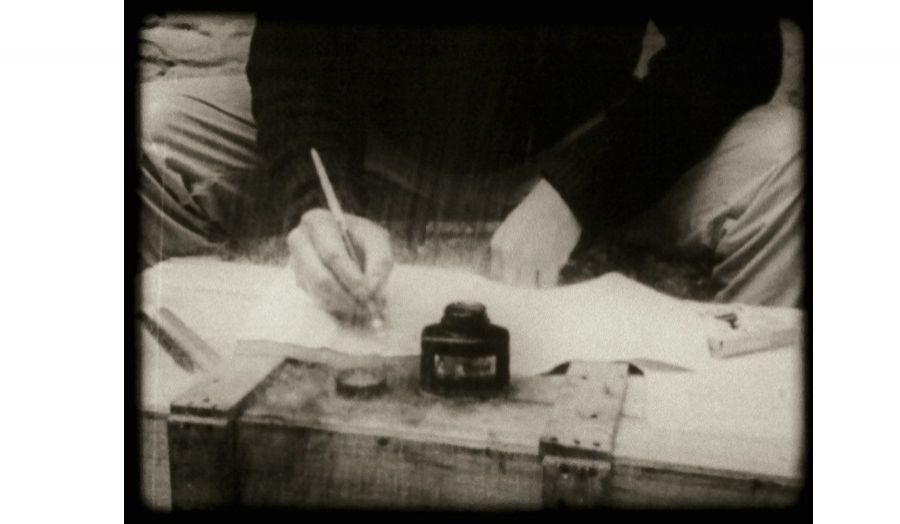Studio Outline
What happens when language interacts with space? What kind of a medium can writing be? What kind of things are words? How do words behave in spaces? How can a practitioner write 'with' their work?
This Dissertation Studio revolves around questions such as these. The seven weeks of programmed teaching will involve visits and study sessions reflecting on the role words play in the visual world, in performative space and in the urban environment. On words inside and outside of writing. These visits are aimed to stimulate conversation and critical discussion within the group.
Any dissertation topic will gain something vital and subtle from paying attention to writing as a medium, and to the forms of language that belong to its subject matter. The studio should also be especially relevant to students (from any subject area/discipline) interested in the following:
- Those interested in writing per se.
- Those who see writing as a medium.
- Those who wish that writing was different.
- Those interested in 'art writing'.
- Those interested in narrative.
- Artists interested in language or in the display of text.
- Designers interested in typography and the transmission of language.
- Architects interested in language carried by buildings and the idea of writing and reading the built environment.
- Those interested in the role language plays in performance.
- Those interested in the 'practice of theory'.
- A multi-disciplinary conversation will be encouraged.
First seven weeks of study
- Week 1: The British Library. Visiting special collections, and meeting for discussion. Considering repositories of knowledge, and the 'material knowledge' in original editions of texts. Searching for material directed by students' research areas.
- Week 2: The National Art Library. Looking at the history of exhibition catalogues. Examining the legacy of temporary exhibitions in publications, and the changing state of artist's book production. Searching for material directed by students' research areas.
- Week 3: The Type Museum. Visit the museum in south London (currently closed to the general public). Considering the means of production of the printed word, and the 'craft of language'.
- Week 4: Architectural/urban geographic tours. Considering the language printed on the city ('ghost signs' on the walls of buildings; signs and instructions) and how the city prints language on a subject (psychogeographical writers and sites).
- Week 5: The Tate Print Collections. Viewing key examples of printed visual language in the Tate's viewing rooms (Gill, Ruskin, Ruscha, Weiner, etc, but directed by students' research areas)
- Week 6: The BBC. Attend the recording of a radio program. Watching the transmission of text into voice into recording. The space of the airwaves as a site for language.
- Week 7: Lord's Cricket Ground/Smithfield Meat Market/The Stock Exchange/Mecca Bingo (location TBC). The performance of specialist language, and the poetry of professional codes. Considering forms of specialist language as verbal cultures, and forms of spatial and numerical interaction.
Contact Tutor David Price
Reading List
We will look at many different kinds of words in space - in visual art, on buildings, on the airwaves, echoing within buildings, running off printing presses, whispered in libraries, as well as on the page. Key names: Ed Ruscha, Samuel Beckett, Bruce Nauman, Marcel Broodthaers, the Speaking Clock, Art & Language, Bas Jan Ader, Eric Gill, the Shipping Forecast, amongst others. But this list will also include the research areas that you will be writing about, and the ways that language works within them. The libraries/archives to be visited are key resources in themselves, in addition to sites such as X Marks the Bökship at Matt's Gallery.
This list gives some guideline texts:
- 1. Robin Kinross, Unjustified Texts: Perspectives on Typography (London: Hyphen Press, 2002).
- 2. Charles Harrison, Essays on Art & Language (Cambridge: MIT Press, 2003.)
- 3. Samuel Beckett, The Complete Short Prose of Samuel Beckett (London: Grove Press, 1997).
- 4. Walter Benjamin, Illuminations (London: Random House, 1999).
- 5. Maurice Blanchot, The Space of Literature (Nebraska, 1982).
- 6. Ed Rushca, Leave Any Information at the Signal (Cambridge: MIT Press, 2002).
- 7. Gilles Deleuze, Essays Critical and Clinical (London: Verso, 1998).
- 8. Iain Sinclair, Downriver (London: Random House, 1991).

